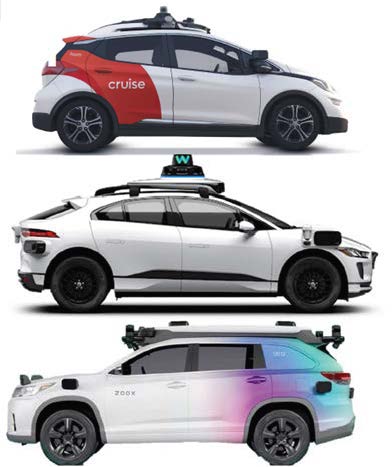Autonomous Vehicles (AVs) in San Francisco
Background
San Francisco and the Phoenix area are the world’s leading cities for testing of automated driving. “Autonomous Vehicles” or “AVs” are designed to be operated by a suite of sensors, software, and hardware that performs all tasks of driving, rather than by human drivers. Cruise, Waymo and Zoox have had the largest and most visible AV fleets operating in San Francisco for several years. There are no AVs currently on the market for purchase in the United States. Rather, AVs are currently operated by their developers in fleets controlled by the developers. In 2022, Cruise and Waymo began operating AVs with no human driver behind the wheel in San Francisco.
In contrast with AVs, there are many motor vehicle features that automate certain parts of the driving process. Automated features such as automatic transmission and cruise control have been available for decades. More recently developed features, such as Automatic Emergency Braking, Forward Collision Warning, Lane Departure Warning, and many others are referred to as Advanced Driver Assistance Systems (ADAS). These features are designed to support human drivers who remain fully responsible for driving. Even the Tesla “Full Self Driving” software is an ADAS feature. A driver using Full Self Driving remains responsible for paying continuous attention and maintaining control over their vehicle. The National Safety Council “My Car Does What?” site offers useful information about the wide range of ADAS features: https://mycardoeswhat.org
San Francisco has no permitting authority over AVs on city streets. California law gives the Department of Motor Vehicles (DMV) authority to issue permits to test the operation of AVs on public streets of vehicles where a combination of sensors, software, and hardware are responsible for driving. DMV permits may authorize testing with safety drivers or without safety drivers. They can also authorize commercial deployment of automated driving. Even where there is no human driver behind the wheel, state regulations require automated vehicles to be monitored by remote human supervisors. Information about the DMV’s AV program can be found on the DMV website here: https://www.dmv.ca.gov/portal/vehicle-industry-services/autonomous-vehicles/
California law gives the California Public Utilities Commission (CPUC) authority to issue permits to provide passenger services in automated vehicles. A company can only get a permit to provide passenger service when it has obtained an appropriate underlying permit from the DMV. The CPUC also authorizes passenger services testing with and without the presence of a safety driver behind the wheel and authorizes commercial deployment with and without the presence of a safety driver. Information about the CPUC’s AV passenger services programs can be found here: https://www.cpuc.ca.gov/regulatory-services/licensing/transportation-licensing-and-analysis-branch/autonomous-vehicle-programs
While all of the vehicles below have been seen frequently on San Francisco streets, Cruise suspended testing operations in San Francisco and nationwide in October 2023.

The U.S. Department of Transportation, including both the Federal Motor Carrier Administration and the National Highway Traffic and Safety Administration, has authority to regulate automated driving. As of early 2024, the federal government has not adopted minimum safety standards to govern automated driving. However, automated vehicles are required to comply with all the traffic laws that regulate human drivers.
San Francisco AV Policy
Since 2018, the SFMTA has been working with companies that operate AVs in San Francisco and with state and federal regulatory agencies. Our work with industry and regulators is informed by our foundational transportation policies:
- Transit First
- Vision Zero
- Climate Goals
- Guiding Principles for Emerging Mobility Services and Technologies
As steward of San Francisco streets for safe multi-modal use, the SFMTA seeks AV deployment that:
- improves safety for all travelers,
- helps us move more people through our existing streets,
- provides new mobility options for travelers who most need them, including people with disabilities and/or limited income, and
- reduces lifecycle greenhouse gas emissions and toxic air contaminants.
San Francisco comments on State and Federal Regulatory Proceedings about Autonomous Vehicles can be found here: https://www.sfmta.com/reports/sfmta-regulatory-recommendations-transportation-network-companies-tncs-and-autonomous#av-table
AV Testing, Deployment and Passenger Service
The SFMTA does not issue permits for AV testing and operation. However, if you would like to share feedback about your experience with AVs on San Francisco streets, please email us at AVPolicy@SFMTA.com or call 311.
Should you have any feedback you would like to share with the DMV regarding your experience with AVs testing or operating on public roads, please use the following contact information:
Email: AVFeedback@dmv.ca.gov
Website: https://www.dmv.ca.gov/portal/dmv-autonomous-vehicles-feedback-form/
Should you have any feedback you would like to share with the CPUC regarding your experience with AVs providing passenger rides, please use the following contact information:
Email: TransportationPrograms@cpuc.ca.gov
